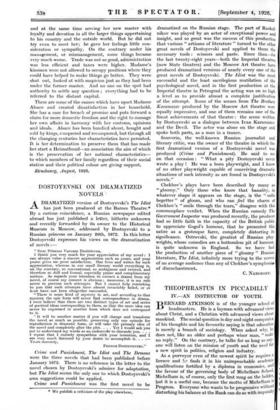I)OSTOYEVSKI ON DRAMATIZED NOVELS
ADRAMATIZED version of Dostoyevski's The Idiot has just been produced at the Barnes Theatre.* By a curious coincidence, a Russian newspaper edited abroad has just published a letter, hitherto unknown and recently forwarded by its owner to the Historical Museum in Moscow, addressed by Dostoyevski to a Russian princess on January 20th, 1872. In this letter Dostoyevski expresses his views on the dramatization of novels :— " Dear Princess Varvara Dmitrievna, I thank you very much for your appreciation of my novel : I can always value a sincere appreciation such as yours, and your praise gives me great satisfaction. One lives and writes for such appreciation, whereas in our small literary world' everything is, on the contrary, so conventional, so ambiguous and twisted, and therefore so dull and formal, especially praise and complimentary notices. As regards your intention to extract a drama from my novel, of course my consent is obvious ; moreover, it is my rule never to prevent such attempts. But I cannot help remarking to you that such attempts have almost invariably failed, or at least have not been altogether successful.
"There is some kind of mystery in art, and according to that mystery the epic form will never find correspondence in drama. I even believe that there are two distinct types of art and series of poetical ideas corresponding to them, so that the same idea can never be expressed in another form which does not correspond to it.
" It will be another matter if you will change and transform the novel as much as possible, preserving only one episode for reproduction in dramatic form, or will take the primary idea of the novel and completely alter the plot. . . . Yet I would ask you not to understand my words as an endeavotr to dissuade you. . . . I repeat that I entirely sympathize with your intention, and I aria very much flattered by your desire to accomplish it. . . Yours sincerely,
FEODOR DOSTOYEVSKI."
Crime and Punishment, The Idiot and The Demons were the three novels that had been published before January 1872. There is no reference in the letter to the novel chosen by Dostoyevski's admirer for adaptation, but The Idiot seems the only one to which Dostoyevski's own suggestions could be applied.
Crime and Punishment was the first novel to be * We publish a criticism of the play elsewhere,. dramatized on the Russian stage. The part of Raskol. nikov was played by an actor of exceptional power and insight, and so great was the success of this production that various "artisans of literature" turned to the other great novels of Dostoyevski and applied to them the necessary tools : scissors and paste. Since then—for the last twenty-eight years—both the Imperial theatres (now State theatres) and the Moscow Art theatre have produced dramatized versions of nearly every one of the great novels of Dostoyevski. The Idiot was the most successful and the least sacrilegious mutilation of the psychological novel, and in the first production at the Imperial theatre in Petrograd the acting was on so high a level as to provide almost a complete justification of the attempt. Some of the scenes from The Brothers Karamazov produced by the Moscow Art theatre were equally impressive, and one of them remains one of the finest achievements of that theatre : the scene writtel. by Dostoyevski as a dialogue between Ivan Karamazov and the Devil. The actor was alone on the stage and spoke both parts, as a man in a trance.
Souvorin, the well-known Russian journalist and literary critic, was the owner of the theatre in which the first dramatized version of a Dostoyevski novel was produced (Crime and Punishment). He said to me on that occasion : " What a pity Dostoyevski never wrote a play ! He was a born playwright, and I know of no other playwright capable of conceiving dramatic situations of such intensity as are found in Dostoyevski's novels."
Chekhov's plays have been described by many as "gloomy." Only those who know that banality, in whatever shape it appears on the stage, is the " onlie begetter" of gloom, and who can feel the charm of Chekhov's "smile through the tears," disagree with this commonplace verdict. When the Russian comedy The Government Inspector was produced recently, the producer had so little faith in the capacity of the British public to appreciate Gogol's humour, that he presented this satire as a grotesque farce, completely distorting its significance. Ostrovski, the greatest of Russian play- wrights, whose comedies are a bottomless pit of humour, is quite unknown in England. So we have had the production of another piece of " gloomy " Russian literature, The Idiot, infinitely more trying to the nerves of an average audience than any of Chekhov's symphonies of disenchantment.
C. ISTABOKOFF,


































 Previous page
Previous page